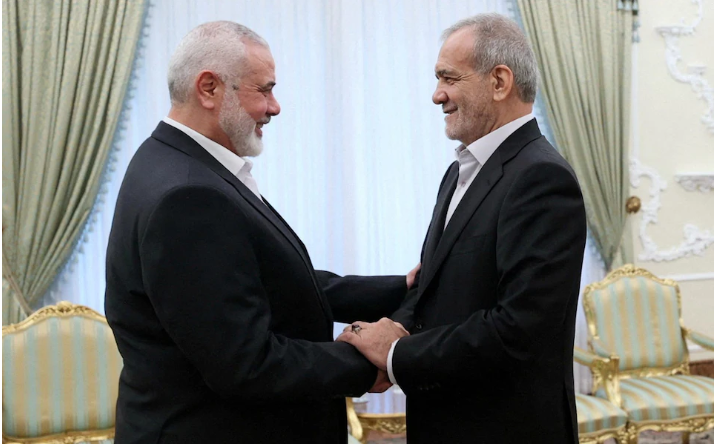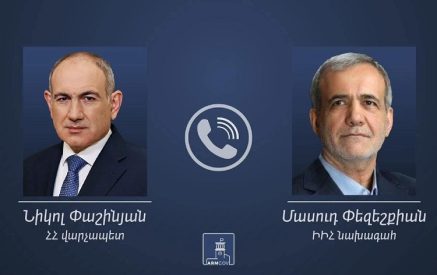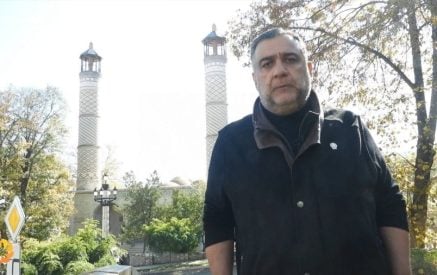Top generals insist on a direct strike on Tel Aviv but Masoud Pezeshkian suggests targeting secret Israeli bases in neighbouring countries
Iran’s new president is battling against the hard-line Islamic Revolutionary Guard Corps (IRGC) in an attempt to prevent all-out war with Israel, The Telegraph has learned.
Tehran’s authorities are divided over how to respond to the assassination of Ismail Haniyeh, the Hamas leader, in the Iranian capital on July 31.
Read also
Top generals within the IRGC are insisting on a direct strike on Tel Aviv and other Israeli cities, focusing on military bases to avoid civilian casualties.
But Masoud Pezeshkian, the newly elected president and a comparative moderate who defeated the IRGC’s candidate in elections last month, has suggested targeting secret Israeli bases in Iran’s neighbouring countries.
Iran has previously targeted what it refers to as “spy bases” of Mossad, the Israeli intelligence agency, in Iraqi Kurdistan.
The IRGC has been trying to undermine Mr Pezeshkian in its pursuit of a more aggressive retaliation against Israel, aides of the president told The Telegraph.
Founded after the 1979 Islamic Revolution to protect the new regime from domestic dissent, the IRGC has evolved into a sprawling organisation with significant influence over Iran’s military, economy and broader society.
The ultimate responsibility for deciding how Iran will respond rests with Ayatollah Ali Khamenei, the supreme leader.
“Mr Pezeshkian fears that any direct attack on Israel would have serious consequences,” said a close aide to the president.
“He mentioned that we were lucky that Iran did not go to an all-out war with Israel last time and maybe not this time,” they added, referring to the April 13 attack when Iran fired more than 300 suicide drones and missiles at Israel.
Tehran’s attack came after a suspected Israeli strike on Iran’s Damascus consulate on April 1 killed seven high-ranking members of the IRGC.
On July 31 the tensions between the two arch-enemies escalated once again when Haniyeh, the leader of Hamas’s political office, was assassinated in Tehran while attending Mr Pezeshkian’s inauguration.
The IRGC’s insistence on targeting Israel is “more about undermining his week-long presidency rather than covering the humiliation they have suffered,” said the presidential aide who spoke to The Telegraph from Tehran.
The New York Times first reported that Mossad planted bombs in the IRGC guesthouse where Haniyeh was staying to carry out the assassination.
Khamenei has threatened Israel with “severe punishment”.
On Friday, Ali Fadavi, an IRGC deputy commander, was quoted by local news agencies as saying that Iran is set to carry out an order by Khamenei to “harshly punish” Israel over the assassination.
Iranian media cited him as saying: “The supreme leader’s orders regarding the harsh punishment of Israel and revenge for the blood of martyr Ismail Haniyeh are clear and explicit …and they will be implemented in the best possible way.”
On Thursday morning, a bout of gun-firing on Iran’s western border prompted Egyptian and British airlines to suspend flights over the country.
It sparked fears an attack could be coming in that time window.
“These recent exercises in the country’s western border are just to intimidate Mr Pezeshkian. Sepah [the IRGC] is very insistent on targeting Israel and they think it is easy,” a second aide to Mr Pezeshkian told The Telegraph.
“He has suggested targeting somewhere related to Israel in the Republic of Azerbaijan or [Iraqi] Kurdistan and let these countries know before that and get done with the whole drama.”
The president “does not feel humiliated as it happened hours after he was sworn in”.
He has also suggested arming the Lebanese Hezbollah with more sophisticated weapons and “letting them fight” with Iran’s intensified support.
Israel maintains diplomatic relations with Azerbaijan, which borders Iran to the northwest.
Many of the people close to Mr Pezeshkian “believe the negligence of Haniyeh’s security was intentional to drag Mr Pezeshkian into war”.
A blame game is now unfolding within the IRGC, The Telegraph understands, as various factions turn on each other over the security breach.
The assassination coincided with Mr Pezeshkian’s first day in office.
During his election campaign, Mr Pezeshkian gained the support of Iranian liberals with a pledge to restore Iran’s international standing through diplomacy and dialogue.
“There have been lengthy and intense discussions where Mr Pezeshkian has been trying to persuade IRGC commanders to avoid actions that could spiral out of control,” said the second aide to Mr Pezeshkian who spoke to The Telegraph.
“He is aware that the IRGC aims to draw the country into a war, yet he is determined to uphold the promises he made during his presidential campaign which included providing peaceful life conditions for people.
“Using his influence within the leader’s office, he is working to prevent the IRGC from plunging Iran into war,” they added.
‘Worried about his own position’
An official within the IRGC told The Telegraph that commanders of the elite military force believe Mr Pezeshkian “is just worried about his own position, but few people in the IRGC listen to him”.
“The number one consideration is still striking Tel Aviv with Hezbollah and others at the same time,” the official said.
“There has been discussion within the forces on how to block Mr Pezeshkian’s efforts. Almost everyone believes what he is insisting on is not in the revolution’s reputation.”
According to the official, in one of the meetings this week, Esmail Qaani, the commander of the IRGC’s overseas Quds force said: “If we do not respond today, they will become even more rude next time.”
The IRGC added long-range missiles and drones to the force’s navy, official media reported on Friday
Iranian state TV said that “a large number of new anti-ship cruise missiles were added to the IRGC naval forces by the order of the Guards chief”.
The missiles “have new capabilities” with “high-explosive warheads and being untraceable”, the broadcaster added.
According to the report, a total of 2,654 military systems including long-range and medium-range missiles, drones for combat and reconnaissance, and electronic warfare units were added to the IRGC’s naval forces.

























































